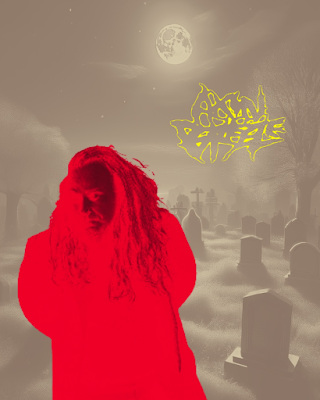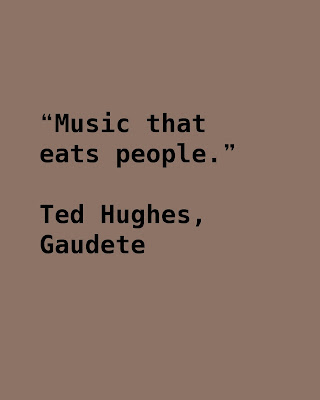Deep & Artistic Inquiries for the Tasmanian Grindcore-Dancefloor Alchemists: AXON BREEZE INTERVIEW by Mark Jenkins.
Deep & Artistic Inquiries for the Tasmanian Grindcore-Dancefloor Alchemists: AXON BREEZE INTERVIEW by Mark Jenkins.
Deep & Artistic Inquiries for the Tasmanian Grindcore-Dancefloor Alchemists
MYTHOLOGY & METAMORPHOSIS
The name "Axon Breeze" suggests neural transmission meeting natural flow. How do you conceptualise the space between thought and movement in your creative process?
AB-
When I started Axon Breeze, I wanted to build a project that was its own weather system. Something that moved and changed in response to what was going on inside that system. Influenced by what was outside too, of course, but prioritising what was going on from within. For me, the forces at play in that system have always been poetry, darkness, and surprise—approached, as my late friend and actor Margaret Cameron would say, with loyalty and disinterest. It’s a brilliant idea—possibly from choreographer Deborah Hay, whom I also worked with—which I take to mean engaging fully, directly, but without clinging.
Your older track "You Snake" invokes Medusa—are you drawn to mythological figures who represent transformation through destruction? What does that serpentine imagery mean to your artistic DNA?
AB-
I’m not totally sure what the snake’s about—I assume it means more than I know. It feels less like a symbol of power or wisdom and more like a mysterious, slithering clown. I’ve shed plenty of skins in plenty of ports and somehow ended up back at the beginning—as a vocalist in a heavy metal band.
I am drawn to brutal truths- the weird, heavy stuff hiding inside the everyday. Like how everything costs something, and how walking to get lunch can feel both meaningless and cosmic. We might seem small, but what we do still finds its way into the celestial sitcom.

You performed at Dark Mofo wearing "fluffy arseless chaps that appear freshly shorn from a sheep"—how does embodying the Pierrot archetype connect to your exploration of disenfranchisement and vulnerability?
AB-
You’re quoting Nick Buckley’s NME review—shout out to Nick—where he picked up on the Pierrot archetype: the sad clown, always longing for meaning or love, just out of reach. I’m not sure I am that, but I like the idea of vulnerability in our music.
The sound can be aggressive and playful, and I think that pairs nicely with vulnerability, not the brand-driven oversharing kind, but real cracks in the armour where light gets in and out. That tension is powerful. Vulnerability’s only interesting to me when it’s holding hands with something bigger—something extreme, even terrifying.
And anyway, I don’t think we choose our clown. Our clown emerges. And maybe, in our case, it is a version of Pierrot coming through.
SOUND AS RITUAL
You describe yourselves as "grindcore for the dance floor"—how do you reconcile the visceral aggression of grind with the communal ecstasy of dance culture?
AB-
The original idea was to collapse extreme metal and club culture—to combine the raw brutality and freedom of death metal with the power and clarity of dance music. That’s where “grindcore for the dance floor” came from. It’s still there, but now it’s got friends—different vocal textures, different emotions. This reflects the nature of the project, which is an experiment - chasing new forms of sound and expression.
The genesis of Axon Breeze goes back to a project I started in 2005 in London called QP Dol, with fellow Flycop member Sandro and my brother Peter. We only played a few gigs—including one at a deaf event (loud) and one at the mansion of Sister Bliss from Faithless, who was a friend. It was a mashup of two big loves: death metal and electronic music. I started hunting for others doing the same, but never found anything that hit quite right. Years later, I was back in Sydney after a stretch in theatre and dance music, and I went to Utopia Records for the first time in a decade. I asked for the electronic death metal section - surely it existed by then. The guy showed me some EBM and goth with electronic drums, but it didn’t have the teeth. I was chasing Mr. Oizo-level production, chromatic monodia in the guitars, and crystal-clear, elevated death growls.
Twenty years later, I picked the idea back up. That was the beginning of Axon Breeze.

New single Gaudete (Latin for rejoice) is referenced as “reframing joy as a hard-won breakthrough—where light comes not as comfort but as rupture” without giving everything away, what is the background to this track and the visual feast of the video?
AB-
I can tell you about the title. Gaudete is a book I read as a young teen that left a lasting and mysterious impact on me. It’s a piece of prose poetry by poet laureate Ted Hughes that digs into ideas of transformation through destruction and rebirth, and picks apart christian morality especially in relation to the body and lust.
The genesis of Axon Breeze goes back to a project I started in 2005 in London called QP Dol, with fellow Flycop member Sandro and my brother Peter. We only played a few gigs—including one at a deaf event (loud) and one at the mansion of Sister Bliss from Faithless, who was a friend. It was a mashup of two big loves: death metal and electronic music. I started hunting for others doing the same, but never found anything that hit quite right. Years later, I was back in Sydney after a stretch in theatre and dance music, and I went to Utopia Records for the first time in a decade. I asked for the electronic death metal section - surely it existed by then. The guy showed me some EBM and goth with electronic drums, but it didn’t have the teeth. I was chasing Mr. Oizo-level production, chromatic monodia in the guitars, and crystal-clear, elevated death growls.
Twenty years later, I picked the idea back up. That was the beginning of Axon Breeze.
LET US REJOICE

New single Gaudete (Latin for rejoice) is referenced as “reframing joy as a hard-won breakthrough—where light comes not as comfort but as rupture” without giving everything away, what is the background to this track and the visual feast of the video?
AB-
I can tell you about the title. Gaudete is a book I read as a young teen that left a lasting and mysterious impact on me. It’s a piece of prose poetry by poet laureate Ted Hughes that digs into ideas of transformation through destruction and rebirth, and picks apart christian morality especially in relation to the body and lust.
I interpret it as a personal purge by Hughes, after the suicide of his wife Sylvia Plath and the horrid period that followed her death. I think Hughes suffered greatly and the poem was a way of unbinding himself and embracing a spirituality that is perhaps more earthbound and tied to the mess of life. I like this idea of rejoicing in the dark - and found myself thinking about it as I emerged from my own darkness.
There's an album also in the pipeline, where does this sit in your clear vision of challenging brutality and beauty? What can you reveal about the future opus dropping?
AB-
Sam and I have created these songs over the last couple of years. The album was recorded by Aaron Cupples (The Drones, Spiritualised), who travelled from London to work with us. Aaron and I met in Guatemala recently to finish tracking, and will meet in Mexico city in August to finish mixing the album. It should be out in October. The focus has been to follow the heat, and that’s taken us into making an album that is pretty diverse style wise. Hopefully, it takes a few listeners by surprise.
GEOGRAPHY & ISOLATION
Creating extreme music from Nipaluna/Hobart puts you at the edge of the world. How does Tasmania's insularity affect your artistic vision—does distance breed intensity?
GEOGRAPHY & ISOLATION
Creating extreme music from Nipaluna/Hobart puts you at the edge of the world. How does Tasmania's insularity affect your artistic vision—does distance breed intensity?
AB-
This takes us back to the idea of weather systems. Lutruwita/Tasmania is its own thing, and it carries a dark history. The loss and destruction caused by colonisation are deeply documented, and since moving here in 2018, I’ve tried to learn from reading and from friends and colleagues. It’s devastating—you can’t unsee it. It’s always there, running through everything. You feel it. But there’s also a strength in the culture that continues. That shapes how you see and feel things, too.
Living in Australia means being clear-eyed about how those stories thread through the present and into the future. Making spooky art there, as we do, you do think twice about what it means and how it might resonate. I try to talk with people connected to Tasmanian Aboriginal culture, while also following my instincts toward what feels hot and meaningful.
Also, Sam and I love to party. We DJ, we produce, we direct and curate events. That’s how we stay warm.
PROCESS & PHILOSOPHY

Your two-piece format forces every sound to carry maximum weight. How do you decide what deserves to exist in your sonic universe versus what gets eliminated?
AB-
With just the two of us, every sound has to earn its place. That’s part of the thrill. There’s nowhere to hide. Initially the songs were electronically based. But since choosing to make it a duo with Sam, we have entered a phase where we create together on guitar and drums. Sam is an incredible drummer. He’s been playing extreme metal on stage since he was 15. We have that in common - we’re both from extreme metal backgrounds but have experience playing other styles. Probably the main thing is our chemistry as players- when we play we can just drop into something completely unplanned and it lands. During the recording process we hit record and jumped straight into playing with no prep and no discussion- just a tempo. A few of the songs that are likely contenders on the album are pure improvisation.
The imagery in your work—butterflies, dust in light, broken teeth—suggests fragility within brutality. Are you trying to find tenderness in extremity?
AB-
Yes.

ARTISTIC EVOLUTION
Your work seems to exist outside conventional genre boundaries—are you consciously trying to create something that can't be categorised, or does that happen naturally?
AB-
Yes.
THE DEEPER CURRENT
What role does catharsis play in your creative process? Are you purging something or summoning something?
AB-
I think spells are more our thing.
Your music feels like it's addressing some fundamental human condition—what do you think people are really responding to when they connect with your work?
AB-
Your music feels like it's addressing some fundamental human condition—what do you think people are really responding to when they connect with your work?
AB-
I have no idea. Maybe they’re surprised by the form of it. It’s not for everyone, and maybe listening to it feels like you've found a special little corner of music that takes you somewhere strange. I know I like that- so maybe that’s it.
If Axon Breeze were to disappear tomorrow, what trace would you want to leave in the collective unconscious of those who experienced your art?
AB-
If Axon Breeze were to disappear tomorrow, what trace would you want to leave in the collective unconscious of those who experienced your art?
AB-
Poetry.
POETRY INDEED, GET GAUDETE INTO YOUR AURAL CAVITIES AND LODGE FORTH INTO YE DNA!!!
ADVENTURE INTO THE INSANITY;














Comments
Post a Comment
Feel free to comment, but anything racist or sexist goes in the bin, as you should also.